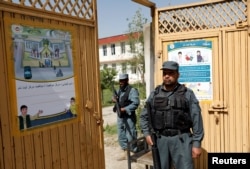The Taliban has ordered its fighters to attack authorities and security forces who are helping organize this month’s parliamentary elections in Afghanistan, denouncing the process as “fake” and “completely bogus.”
The Islamist insurgency in a statement issued Monday called on candidates and voters to boycott the polls, insisting they are being held “for the sole purpose of legitimizing those stooges who are authorized by the occupying forces” in Afghanistan.
While responding to the Taliban's first direct threat to disrupt the elections, a U.S. military spokesman noted the upcoming Afghan democratic process is moving ahead despite the challenge.
"The enemies of Afghanistan pledging to kill people who want to participate in democracy. Encouraging to see the work being done to hold secure and inclusive balloting even with all the challenges," tweeted Colonel Day Butler (@USFOR_A)
The long-delayed elections are scheduled for October 20. More than 2,500 candidates, including 418 women, are competing for the 249 seats in the lower House of Parliament, the Wolesi Jirga.
The Afghan government plans to deploy 54,000 soldiers and policemen to ensure voters’ safety on the polling day. Thousands of U.S-led NATO forces in the country have also vowed to assist Afghan authorities in holding the elections.
“Those people who are trying to help in holding this process successfully by providing security, should be targeted and no stone should be left unturned for the prevention and failure of this malicious American conspiracy,” said the Taliban statement.
The insurgent announcement has raised concerns of more harm to Afghan civilians amid United Nations warnings that civilian casualties have reached new highs in 2018.
“The Islamic Emirate (the Taliban) instructs all its Mujahidin (warriors) to halt this American-led process throughout the country by creating severe obstacles for it,” said the insurgent statement. It also urged Taliban fighters to avoid harm to Afghan civilians, though the United Nations has blamed the insurgency for hurting more civilians this year.
The United Nations Assistance Mission in Afghanistan (UNAMA) warned in a new report on Sunday that insurgent plotted suicide attacks and other improvised explosive devices or IEDs continue to inflict civilian casualties.
“Between 1 January and 30 September 2018, UNAMA documented 3,634 civilian casualties (1,065 deaths and 2,569 injured) from suicide and non-suicide IED attacks. These casualty figures include 247 women casualties (72 deaths and 175 injured) and 608 child casualties (155 deaths and 453 injured),” UNAMA noted.
The Taliban statement on Monday again called on all U.S. and NATO forces to leave Afghanistan, saying this is the only way to end the war, which marked its 17th anniversary on Sunday.
Meanwhile, U.S. special envoy Zalmay Khalilzad has arrived in Kabul to push for peace and reconciliation between the Afghan government and the Taliban.
A spokesman for Afghan President Ashraf Ghani said Khalilzad met with Ghani upon his arrival on Sunday. The U.S. envoy will also travel to neighboring Pakistan, Saudi Arabia, the United Arab Emirates and Qatar where the Taliban maintains its so-called “Political Office”.
The insurgent group has ruled out talks with the Kabul government and has been demanding direct negotiations with the U.S., blaming it for starting the war.
A senior American official for regional diplomacy, Alice Wells, held a “preliminary” meeting with the Taliban in Qatar last July and Khalilzad is expected to further this contact when he visits the Gulf country.





